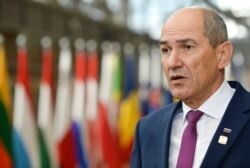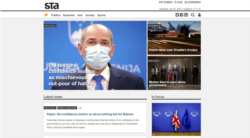Slovenia’s media have played a crucial role in the past 30 years, as the country declared independence, introduced a democratic political system, liberalized its economy and became one of the first former communist states to join the European Union.
But now its journalists, including those at state-funded outlets, are facing political and commercial pressures that risk damaging the independent news industry and the young democracy it helped create.
“For 30 years there has been constant pressure on the public radio and TV station and the main printed media,” said Slavko Splichal, a professor of communication at the University of Ljubljana's Faculty of Social Sciences. But “the media situation has never been as bad as it is now.”
Part of the problem is financial, with lower revenues from advertising and subscriptions. But journalists are also under pressure from some officials or powerful businessmen who verbally assault media or file lawsuits over critical coverage. The government also introduced plans to reduce financing for the public radio and television broadcaster RTV Slovenia and briefly stopped financing the public news agency STA.
Dispersal of subscription fees
The government says the subscription for RTV Slovenia that most households are obliged to pay and that represents more than 75% of the broadcaster's income should partly be dispersed among other media to promote competition. Opposition politicians and many analysts and journalists say they believe the proposed change is an attempt by the government to block critical reporting.
The plans to cut public media funding are at the heart of a motion filed Friday by five opposition parties for a parliamentary vote of no-confidence in the center-right government of Prime Minister Janez Jansa. As well as the media component, the parties are dissatisfied with the government's response to the coronavirus pandemic and its foreign policy.
“It is evident that the government wants to take over both public services, RTV Slovenia and STA,” said Nika Vrhovnik, spokesperson of the largest opposition party, the center-left List of Marjan Sarec.
“The goal is clear: to install people who would be nodding, loyal to the government, would not be critical and would use self-censorship, thus shaping media reports in line with the taste of the government,” said Vrhovnik, whose party is among those pushing for a no-confidence vote.
If the vote, which is expected to take place next week, would gain majority support in parliament, it would oust Jansa's minority government and replace it with a new center-left cabinet.
Jansa, head of the Slovenian Democratic Party, took power in March after the previous center-left prime minister, Marjan Sarec, resigned.
Legally bound to be 'independent'
RTV Slovenia and STA are considered important sources of news for Slovenians. They are bound by legislation to be “autonomous and independent” and to produce accurate and objective news, independent of any political or economic group.
In July, the Ministry of Culture prepared draft media laws that would reduce public financing of RTV Slovenia and increase government control over STA by enabling the government to nominate most members of its supervisory board.
The drafts, which have not yet been endorsed by the government, attracted strong criticism from the opposition, the media and members of the public, and raised concern from the European Commission.
“The drafts are in preparation ... so it is too early to say when they will be sent into the parliamentary procedure,” the communications office of the ministry said in a statement to VOA.
Late last year, the government temporarily stopped financing STA, saying the agency had failed to present documents the government required to assess its financial needs. In December it asked the European Commission to explain whether state aid to STA was in line with EU rules.
STA was established when Slovenia declared independence, and it derives about half its funding from the government.
Slovenia's Government Communication Office said it had temporarily resumed financing of STA on Thursday after receiving a message from European Commission Executive Vice President Margrethe Vestager “which indicates that the European Commission is likely to give a nod to state aid to STA.”
A spokesperson for the commission told VOA that state aid rules enable member states to grant aid to press agencies and that “European rules cannot serve as an excuse to stop the funding.”
Some officials have accused STA of bias. In October, Jansa described the broadcaster on Twitter as a “national shame.”
#STA je nacionalna sramota, eklatantna zloraba imena, ki ga nosi @STA_novice https://t.co/7E4GAo8swG
— Janez Janša (@JJansaSDS) October 15, 2020
The criticism came after STA ran a longer story on a local rapper’s new album than it did on Jansa’s meeting with his Hungarian counterpart, Viktor Orban.
The prime minister has used social media to attack critical media that question his handling of the coronavirus crisis, accusing them of spreading lies or being pro-opposition.
STA head Bojan Veselinovic dismissed the criticism and said STA's reporting has always been unbiased.
“This [government’s] maneuver shows that we are dealing with a policy aimed at financially draining the STA,” Veselinovic said.
Pressure 'unacceptable'
Uros Urbanija, head of the Government Communication Office, which is responsible for financing the STA, denied that the government was pressuring the media.
"Any pressure on the media from the government or its officials is unacceptable,” said Urbanija. “The media should be independent of the government. Otherwise they become a public relations tool. Media are a part of the market and should be treated as such.”
He added that freedom of speech also applied to the prime minister, who is allowed to be critical of the media on Twitter, which Jansa often uses to communicate with the public.
Vestager and another commission vice president, Vera Jourova, defended the role of media in a letter to STA on Tuesday. “It is crucial for democracy and for our common EU values that media should be able to work freely and independently everywhere in the European Union,” the statement said.
Splichal, the academic, pointed out that media in other countries also face commercial and political pressure but said the challenges are more distinctive in Slovenia because of the small size of the country, which has a population of 2 million.
“If the present government would succeed in silencing the STA and the public TV .... that could give a lethal blow to democracy,” said Splichal.
Threat to democracy
Tanja Staric, a journalist with TV Slovenia, which is part of RTV, said she was worried about the future of Slovenian media but believed there was room for independent reporting, for now.
“Public media has a more important role than ever because it prevents us from drowning in fake news. We need journalism to reveal the mistakes of those in power, to check information,” said Staric. “The collapse of media financed by public funds would be a road to a collapse of democracy.”






